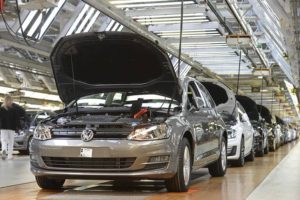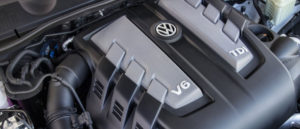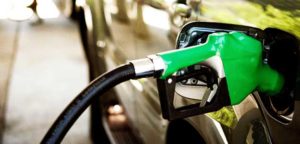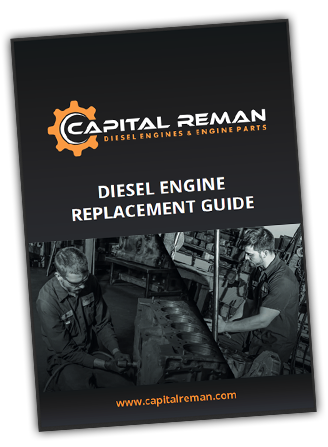Why Diesel Engine Cars Aren't More Popular in the U.S.
 America is run on gasoline, pure and simple. Billions of tons of good each day are shipped every day in this country but the majority of engines in this country are gas engines. Unlike our brothers in Europe, the vast majority of U.S. car buyers prefer their gasoline engines vs. a diesel engine. In fact in Europe diesel powered automotive models account for more than half of all the vehicle sales with Italy and France having over 70% market share of diesel cars.
America is run on gasoline, pure and simple. Billions of tons of good each day are shipped every day in this country but the majority of engines in this country are gas engines. Unlike our brothers in Europe, the vast majority of U.S. car buyers prefer their gasoline engines vs. a diesel engine. In fact in Europe diesel powered automotive models account for more than half of all the vehicle sales with Italy and France having over 70% market share of diesel cars.
It makes perfect sense from a purely logical standpoint to buy a diesel engine: diesel engines are roughly 45% more efficient that a gasoline powered engine. The fuel cost savings would make anyone think twice about purchasing a diesel engine.
In past years gas prices reached an all-time high with a barrel of oil reaching $147.27 in July of 2008. During that time diesel automotive sales rose steadily in America. However, as the oil and gas market bottomed out in 2014 the demand dropped off again. As of August 2016 the price had dropped to $47.32 a barrel. Gas all over America is at or below $2.00 a gallon.
Still Americans, by in large, don’t fully embrace diesel engines. The word “diesel” has a negative connotation in America. When people think of diesel they think of smelly, loud and polluting trucks. Diesel engines of the past were known to be polluters however the emissions issues that plagued older generations of diesel engines have been solved. The EPA Tier Regulations starting in the mid 1990s and continuing up through 2034 guarantee that engines pollute less. Diesel particulate filters, diesel exhaust  fluid, selective catalytic converters and exhaust gas recirculation technology have reduced NOx emissions by 72% on average. The initial engineering with these environmental technologies, back in the mid 2000s, reduced engine horsepower. Many consumers of diesel trucks hated the newer technologies due to the increased maintenance costs, lower torque ratios and reduced horsepower. Today those problems have been solved and in fact emissions technology has been shown to increase horsepower and engine efficiency output. Cummins is introducing, in 2017, a diesel engine that reduces NOx emissions by well over 90% and will deliver one of the highest power ratings for a diesel engine. Still the stigma remains.
fluid, selective catalytic converters and exhaust gas recirculation technology have reduced NOx emissions by 72% on average. The initial engineering with these environmental technologies, back in the mid 2000s, reduced engine horsepower. Many consumers of diesel trucks hated the newer technologies due to the increased maintenance costs, lower torque ratios and reduced horsepower. Today those problems have been solved and in fact emissions technology has been shown to increase horsepower and engine efficiency output. Cummins is introducing, in 2017, a diesel engine that reduces NOx emissions by well over 90% and will deliver one of the highest power ratings for a diesel engine. Still the stigma remains.
Many automakers are still investing heavily in diesel technology. Even higher end automakers such as Porsche is offering a diesel powered Cayenne and Panamera model. BMW recently released the M-Performance diesel models which contain a whopping three turbos. These new models are all in compliance with American and European emissions regulations regarding CO2 production yet zip down the road with speed and grace.
Overcoming the VW Diesel Engine Scandal
 Mid-priced car makers such as Chevrolet and Mazda are also jumped on board the diesel train. In 2013, Chevy introduced a Chevy Cruze model with a 160HP 2.0L turbocharged diesel which will gets impressive 42 miles per gallon. Mazda has released a CX-5 Crossover which competes with the Porsche Cayenne on fuel efficiency. Diesel sales peaked five years ago when sales jumped an impressive 27.4% in the United States. However, the Volkswagen Scandal of 2015 put a screeching halt to much of the automotive diesel sales in America. The company was found to be in violation of the Clean Air Act of 1970 and was fined by the EPA. The company knowingly covered up the fact that its engines were not emissions compliant and fudged data to pass emission tests. The scandal cost the company $1.2 billion and set-back the reputation of diesel automotive engines in America. The company has fixed some 11 million cars worldwide and has spent on average of $1.86 million to dealers as compensation for unsold cars.
Mid-priced car makers such as Chevrolet and Mazda are also jumped on board the diesel train. In 2013, Chevy introduced a Chevy Cruze model with a 160HP 2.0L turbocharged diesel which will gets impressive 42 miles per gallon. Mazda has released a CX-5 Crossover which competes with the Porsche Cayenne on fuel efficiency. Diesel sales peaked five years ago when sales jumped an impressive 27.4% in the United States. However, the Volkswagen Scandal of 2015 put a screeching halt to much of the automotive diesel sales in America. The company was found to be in violation of the Clean Air Act of 1970 and was fined by the EPA. The company knowingly covered up the fact that its engines were not emissions compliant and fudged data to pass emission tests. The scandal cost the company $1.2 billion and set-back the reputation of diesel automotive engines in America. The company has fixed some 11 million cars worldwide and has spent on average of $1.86 million to dealers as compensation for unsold cars.
For the most part though, America will stay a gasoline powered country. Hybrids and electric cars are the most sold alternative fuel vehicles in the United States. Car makers like Tesla, Chevy, Toyota, Nissan and Honda have all introduced hybrid or full electric cars. Some, mostly German automakers, like Mercedes-Benz are still experimenting with dual gasoline and diesel engine vehicles. The company introduced two new E-Class hybrid vehicles: the diesel one gets 56 mpg while the gas powered one gets 26 mpg. However, only the gas powered vehicle will be available to the US market. President Obama announced in 2011 that the Corporate Average Fuel Economy (CAFE) for automakers must be 54.4 mpgfor the entire fleet of vehicles offered by the year 2025. These new regulations will save the consumer $1.7 trillion in fuel prices over the life of the program. It would make sense to build diesels all over America. Yet, automakers and consumers alike are not on board with diesel for the American auto market.
President Obama announced in 2011 that the Corporate Average Fuel Economy (CAFE) for automakers must be 54.4 mpgfor the entire fleet of vehicles offered by the year 2025. These new regulations will save the consumer $1.7 trillion in fuel prices over the life of the program. It would make sense to build diesels all over America. Yet, automakers and consumers alike are not on board with diesel for the American auto market.
American Consumer Attitude Towards Diesel Engines
Automaker, Mazda, shed some light on why diesel aren’t more popular in America stating that the benefits are not immediately obvious to U.S. consumers. The pump price of diesel is far more expensive than gasoline; even more than the premium fuel option. The savings of a diesel engine come with the fuel economy over the life of the engine. A diesel engine costs more to build and is more expensive to purchase. The consumer has to calculate the savings over the years of driving.
Americans can do the math and grasp the concept of long-term fuel savings but overall consumer behavior tends to favor instant gratification and lower initial prices. If a consumer leases a vehicle the fuel savings of diesel engines are not worth the upfront costs. The average is 40%-45% more mileage out of a single tank of diesel fuel vs. gasoline. However, the initial costs are $2,700 more than a gas powered option. Mazda’s price argument can be considered to be rather weak at best. Hybrids are selling at more than three times the rate of diesel engines in America and cost at least $6,500 or more than gas powered engines. The real problem of diesel powered cars in America has always been an image issue. Diesel is still associated with dirty, loud and outdated technology used for trucks and heavy equipment. Hybrids are sleek, sexy and environmentally friendly which resonate with the average consumer.
Mazda’s price argument can be considered to be rather weak at best. Hybrids are selling at more than three times the rate of diesel engines in America and cost at least $6,500 or more than gas powered engines. The real problem of diesel powered cars in America has always been an image issue. Diesel is still associated with dirty, loud and outdated technology used for trucks and heavy equipment. Hybrids are sleek, sexy and environmentally friendly which resonate with the average consumer.
With gas prices at the lowest levels in years there really is no incentive to purchase a technology that is neither sleek nor cheap. Gas prices in Europe are well over $7.00 per gallon which makes diesel an attractive option when every drop of fuel counts. The cost between gasoline and diesel wouldn’t be that much if the U.S. government didn’t impose such a high federal tax on diesel fuel and refineries were willing to sell diesel to the American market instead of selling it to Europe where it is in very high demand. None the less economic forces have put the diesel engine on the back burner for time to come here in America. It looks like the automotive market in America will belong to the gas powered engine for the time to come.




